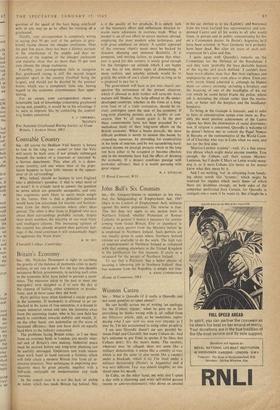Br i ta in "s Economy SIR, --Mr. Nicholas Davenport is right in ascribing
the gravity of the balance of payments crisis to party politics, at any rate in part. For the last two decades successive British governments, in tackling each crisis in the economic field, have failed to prevent a recur- rence. The measures taken in the past to meet any emergency were designed as if to save the day at the expense of halting either expansion or produc- tivity, and in most cases they did both.
Party politics have often hindered a steady growth in the economy. If monopoly is allowed to go un- checked in the name of free enterprise, it is bound to create industrial unrest and take the incentive away from the upcoming trader, who in his own field has much to contribute towards stability and wealth. If, on the other hand, you nationalise on the score of increased efficiency, then you have dealt an equally hard blow to the industry concerned.
The problems facing Britain today, as 1 see them from an overseas bank in London, are mostly inter- nal and of Britain's own making. Industrial peace must be secured before any long-term planning can be usefully envisaged. Employers and trade unions must work hand in hand towards a formula which will help create a modern Britain free from all re- strictive practices. Ncw techniques in improving pro- ductivity must be given priority, together with a full-scale onslaught on modernisation and trade overseas.
In the export race it is not the lack of ability . or talent which has made Britain lag behind. Nor
is it the quality of her products. It is simply lack of the necessary effort and enthusiasm directed to- wards more adventure in overseas trade. What is needed is an all-out effort to secure markets abroad. employing the most modern sales techniques, and with great emphasis on details A careful appraisal of the overseas client's needs must be backed by dynamic planning and immense flexibility. It is pompous• and inviting failure, to assume that what- ever is good for this country is surely good enough for the foreigner—an attitude which I am happy to sec has of late shown signs of diminishing. A more realistic and sensible attitude would be to gratify the whim of one's client abroad as long as he is prepared to pay for it.
The government will have to put into clearer per- spective the seriousness of the present situation. which if allowed to drift further will certa.nly make matters still bleaker. Any help offered to tile under- developed countries, whether in the form of a long- term loan or of a trade concession, should be en- tirety contingent upon the state of the economy. 11 long-term planning permits such a facility or con- cession. then by all means grant it. In the past these commitments have not been preceded by a meticulous study of their long-term effects on the British economy. When a boom prevails. the most difficult problem is surely to sustain this boom, by expanding resources, by providing for eventualities in the form of reserves, and by not squandering hard- earned income on prestige projects which in the long run have either. to be scrapped or become obsolete and in the meantime have had the effect of draining the economy. If a project combines prestige with economic solvency, then it is worth pursuing with great vigour.
35 Royal Crescent, W
N. I. ATTALLAH






























 Previous page
Previous page